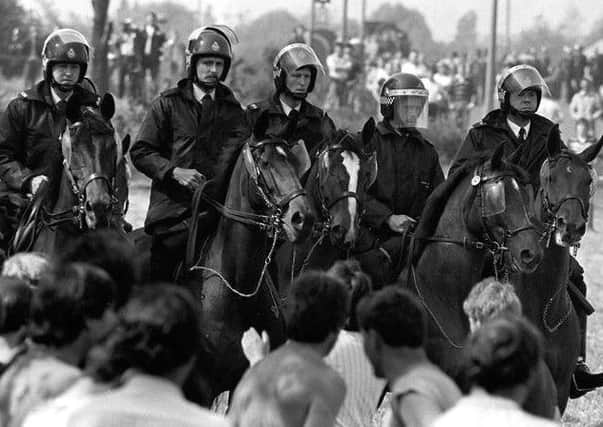Tom Richmond: Truth over Orgreave is in police force's own archive


What is still in question, however, is whether Mrs Thatcher’s administration exerted undue pressure on South Yorkshire Police and, in doing so, whether the executive compromised the judiciary’s integrity.
This is why Home Secretary Amber Rudd was wrong to reject calls for an inquiry into the police’s response to the aftermath of the so-called Battle of Orgreave on June 18, 1984.
Advertisement
Hide AdAdvertisement
Hide AdOn the night of these ferocious clashes, Mrs Thatcher received a four-page typed memo, entitled The Coal Dispute: Misc 101 Papers On The Law, from John Redwood, who headed her policy unit before forging his own political career.
It was certainly received – and read – by the PM. The first page includes the initials ‘MT’ in Mrs Thatcher’s own handwriting. Various passages are underlined with the same pencil.
It begins: “The scenes we have all seen on our television screens night after night show a confusion between peaceful picketing, demonstration, and general disorder.”
There is a section ‘Action to control picket lines’ which says: “Sometimes the police tactics work well, sometimes badly.”
Advertisement
Hide AdAdvertisement
Hide AdHighlighting the difficulties in controlling the picket lines, it suggests a new law to replace riot and unlawful assembly: “This could be achieved by rapidly concluding the review of public order law reform, which has been going on for four years.”
It suggests that the “Home Office should encourage the police to adopt present best tactics for picket control more widely, so as to split small numbers of pickets from large masses of demonstrators”.
This is all on the record because the paperwork is accessible on the website of the Margaret Thatcher Foundation after being declassified under the 30-year secrecy rule. As I revealed in May, correspondence by the late Leon Brittan, the then Home Secretary, demonstrated the PM’s direct involvement in the day-to-day policing by the South Yorkshire force.
Another memo from the post-Orgreave period is one that Mrs Thatcher requested from Lord Hailsham, the Lord Chancellor, on whether courts had sufficient resources to process all those arrested on the picket lines. An area-by-area breakdown was provided.
Advertisement
Hide AdAdvertisement
Hide AdWhat is not available, however, is the correspondence – and transcripts of telephone conversations – between the Government and the South Yorkshire force, and whether there’s any credence to the claim made in Parliament this week that Mr Brittan told Mrs Thatcher that he wanted “to increase the rate of prosecutions”.
Why can’t a Parliamentary select committee, for example, be entrusted with cataloguing all the relevant material from the archives of South Yorkshire Police, the Metropolitan Police, military and security services, so this information can be put in the public domain? Given that Ms Rudd refused to say whether she had studied this documentation, the incendiary charge of a state-sponsored cover-up will haunt her tenureship of the Home Office.
The fact that Labour did not act from 1997-2010 offers no defence if she’s truly committed to justice for all.
AS Hillary Clinton’s emails come under FBI investigation ahead of Tuesday’s US Presidential election, is there a case for David Cameron’s electronic communications on Brexit also being made public to reveal his inept mismanagement of the EU referendum?
Advertisement
Hide AdAdvertisement
Hide AdPolitical journalist Tom Shipman’s compelling account of Brexit, All Out War, reveals how Michael Gove – then a Cameron confidante – emailed the PM and said that he did not need to hold a vote to settle Tory soul-searching on this issue. The reply? “Don’t worry, I know what I’m doing.”
And then there’s the note the PM sent Andrew Cooper, his former director of strategy, during renegotiation talks with EU leaders.
“Frankly, after a day and a half of talks with these people, even I want to leave the EU. I’m getting nowhere, I might have to walk away,” he bemoaned.
Perhaps Mr Cameron should have done. Yet to what extent were official channels bypassed by Mr Cameron’s own emails, and text messages like the “You should have stuck with me, mate” missive sent to Boris Johnson after the former Mayor of London had been stabbed in the front by the aforementioned Mr Gove?
Advertisement
Hide AdAdvertisement
Hide AdJust as lessons had to be learned from Tony Blair’s ‘sofa government’ during the Iraq invasion, surely the same principle applies to Mr Cameron’s leadership over the EU which increasingly appears to have been determined by opinion polls, and personal score-settling, rather than the national interest?
SIR David Higgins, chairman of HS2 Ltd, made a couple of interesting points when he did the media rounds to promote high-speed rail’s economic spin-offs.
As well as quicker journey times, and more capacity, he highlighted the benefits of improved reliability on trains from Leeds to Sheffield and Birmingham.
A brand new rail line, he said, will mean trains “run to the minute” because the infrastructure will be far more resilient.
Advertisement
Hide AdAdvertisement
Hide AdSir David also backed a high-speed line from Hull to Liverpool, though he suggested that this could be achieved by upgrading the existing railway line.
If a new route is required to guarantee more reliable services between the North, the Midlands and London, surely the same principle must equally apply to east-west services if the economic potential of Yorkshire and the North West is to be fully realised?
Or will these trains, too, have to go via London?